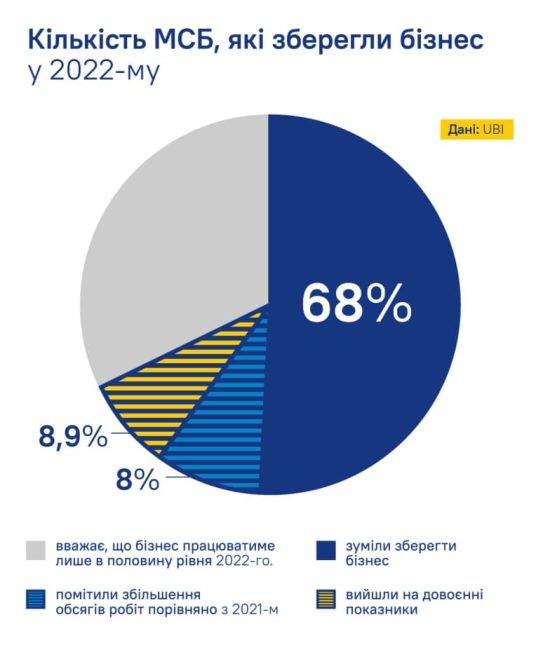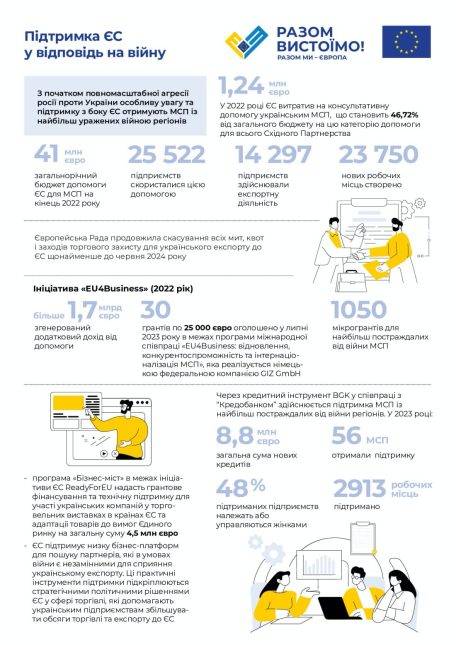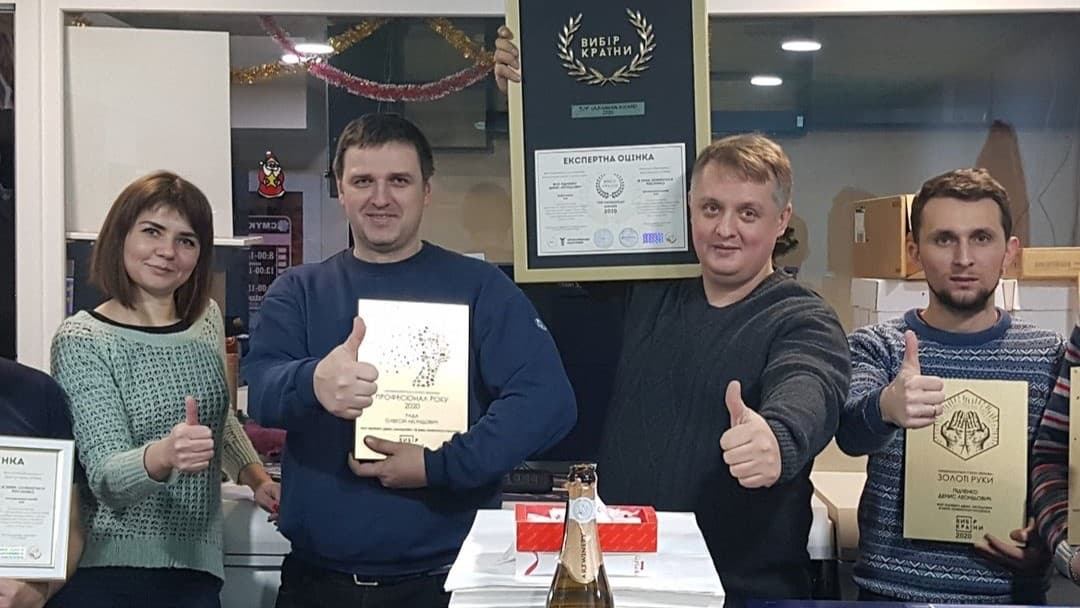
Together We Are Resilient. EU strengthens support of Ukraine’s SMEs in response to the work and for the sake of recovery
Since the beginning of the full-scale Russian invasion on 24 February 2022, Ukrainian businesses have faced unprecedented challenges. As a result, the activity and satisfaction with economic realities, an indicator of the Ukrainian Business Index (UBI), stood at 36.6 out of 100 in November.
Nonetheless, 68% of small and medium-sized enterprises still managed to keep their businesses afloat in 2022, according to the UBI. Of them, 8.9% saw an increase in the volume of work compared to 2021 and 8% reached pre-war levels. Almost a quarter of existing enterprises believe that the business will work only at half the level of 2022. Full-fledged rapid recovery is hampered by a shortage of capital, high taxes, inaccessibility of credit funds, downsizing, or indefinite ‘vacation’ time of personnel.

In these difficult conditions, the assistance of international organizations is essential. The European Union, one of the most powerful systemic donors to Ukraine for many years, has focused its resources on supporting small and medium-sized businesses since the start of the full-scale Russian invasion. Grants for SMEs, consultations, support for businesses relocated from the war zones, lifting of trade quotas on exports, assistance in finding new markets, and partnerships are the key vectors of EU programs to help Ukrainian businesses. The article further discusses the main areas of support for Ukrainian businesses from the EU.

Why does the EU support SMEs of Ukraine?
After the start of the full-scale Russian military invasion of Ukraine, the ability of businesses to take out loans decreased. There was no longer a discussion about investment funds. There was a need for non-repayable assistance and working capital. Therefore, all EU-funded projects were reoriented, explains Iryna Hubarets. “New areas have emerged, i.e., microgrants, as well as small and medium grants for amounts and goals adapted to the needs of different categories of entrepreneurs. Over 1,100 grants were provided from February 2022 to December 2023 for a total of EUR 5.5 million under the EU4Business programme. This helped businesses stay afloat in difficult times,” she explains.
“After the start of the full-scale Russian invasion, the EU focused on supporting micro, small, and medium-sized enterprises (MSME) of Ukraine. Their situation was more difficult, with fewer possibilities, smaller financial cushion, and resilience. The MSME are the focus because they are the catalyst of the country’s economic development, a source of jobs, and innovation. They are the middle class, which is a marker of social progress.”
Iryna Hubarets
Sector Manager, Competition and Economic Cooperation Sector of the EU Delegation to Ukraine
In these difficult times, the EU focused on helping relocated companies and their integration in new municipalities, SMEs operating in deoccupied territories, supporting clusters, social companies, and business initiatives of youth. Solidarity Lanes have also been launched.”
How does the EU help Ukraine’s SMEs?
Key areas of support:
- Financial instruments, access to funding;
- Consulting for businesses;
- Improvement of business environment and conditions.
There are currently 15 bilateral projects from the EU being implemented only in Ukraine. The total amount of their financing is €92 million. Ukraine also participates in pan-European programmes, including Horizon Europe (focus on innovative business and scientific research), Creative Europe (support for cultural and creative industries), Digital Europe (digitization tools for SMEs), Single Market Programme (business competitiveness), EU4Business (comprehensive support for entrepreneurship in the Eastern Partnership countries, including Ukraine).
“Ukrainian SMEs face internal and external challenges,” says Iryna Hubarets. “The former primarily include uncertainty and the inability to predict the duration of the war, as well as disrupted supply chains, lack of raw materials, shrinking domestic market and consumer demand.”
External factors are related to the requirements for integration into the European Single Market. The biggest challenge for businesses there is the need to compete fairly at a high level, accept common rules of the game, and ensure compliance of products with European standards. Some Ukrainian businesses still don’t operate entirely transparently, but if they want to succeed in the European market, they will have to adapt to its rules, as well as learn to present themselves, improve marketing skills, negotiation skills, and sales channels,” summarizes Hubarets. “There is no room for compromise here.”
“Ukrainian SMEs face internal and external challenges,” says Iryna Hubarets. “The former primarily include uncertainty and the inability to predict the duration of the war, as well as disrupted supply chains, lack of raw materials, shrinking domestic market and consumer demand.”
External factors are related to the requirements for integration into the European Single Market. The biggest challenge for businesses there is the need to compete fairly at a high level, accept common rules of the game, and ensure compliance of products with European standards. Some Ukrainian businesses still don’t operate entirely transparently, but if they want to succeed in the European market, they will have to adapt to its rules, as well as learn to present themselves, improve marketing skills, negotiation skills, and sales channels,” summarizes Hubarets. “There is no room for compromise here.”
Survive and grow: CMYK printing company was able to keep skilled employees thanks to an EU4Business grant
CMYK printing company has been operating in Slovyansk since 2002, offering outdoor advertising, digital printing, design, and interior decoration of commercial premises. The company opened branches in Kramatorsk and Kharkiv and had orders from international organizations. At the beginning of the full-scale Russian war, the company suffered losses. “As of February 24, many clients did not pay for orders, and our employees were left without salaries because we form our payroll from the 20th of one month to the 5th of the next,” explains Denys Pidchenko, the owner of the company.

In April 2022, the team learned from the Donetsk Chamber of Commerce and Industry about the project to help businesses relocate. They quickly submitted documents through “Diia”, and in May they went through interviews with managers of the EU4Business programme, received approval for financial assistance of UAH 150,000, and the first tranche.
“Thanks to the support under the EU4Business programme, CMYK relocated to Kropyvnytskiy in May 2022. The company rented leased a warehouse and an office. Assistance with the working capital allowed the company to make loan payments and repay salary debts to its employees.”
Denys Pidchenko
CMYK owner
In June, the company resumed production of products for international non-governmental organizations, reached 20% of pre-war profits, and won an international tender. Now CMYK is increasing production volumes, striving to reach the European level, and planning to open a branch in Poland.
EU4Business initiative for SMEs: details
EU4Business: Recovery, Competitiveness and Internationalization of SMEs is an international cooperation programme jointly funded by the European Union and the German government and implemented by the German federal company Deutsche Gesellschaft für Internationale Zusammenarbeit (GIZ) GmbH. The programme is aimed at supporting the economic stability, recovery, and growth of Ukraine, creating better conditions for the development of Ukrainian SMEs, as well as supporting innovation and export. The programme started in 2020 and will run until 2025.
Over 1,100 micro, small and medium-sized enterprises have received grants under the EU4Business programme for a total of around EUR 5 million. Under the programme, another 180 grants worth over EUR 2 million will be allocated for businesses.
There are two vectors of interaction between the EU4Business programme and businesses.
The first one includes grants to support the liquidity of SMEs on liberated territories and ensuring the possibility to supply their products. The task of the second vector of support focused on SMEs with potential for competition and export to the EU is to transfer the experience of entering and doing business in the European Union countries to them. For this purpose, business consultations, trainings, study tours, forums, and meetings are held. Our goal is not just to give fish, but to hand over a fishing rod and teach businesses to achieve results on their own.
Maryna Kovtun
Program Component Manager of the EU4Business: SMEs Competitiveness and Internationalization, Deutsche Gesellschaft für Internationale Zusammenarbeit (GIZ) GmbH
“Since the launch in 2020, the EU4Business programme has helped over 15,000 Ukrainian businesses to survive, recover, grow, and export, first during the pandemic, and now during the full-scale Russian aggression against Ukraine. We maximize the programme’s assistance to entrepreneurs through business consultations from professional experts, business mentoring by successful company leaders, study trips, trainings, educational programs at business schools, as well as through grants to support and develop businesses. As of December 2023, over 1,100 businesses have received grants for a total of EUR 5.5 million.
Kateryna Kryvoshei
Programme Component Manager of the EU4Business: Business Grants for SMEs, GIZ
During the economic recession caused by the full-scale Russian war against Ukraine, the assistance of international organizations is very timely for stabilizing the economy and supporting businesses. Through this assistance and access to the European market, Ukraine’s economy can gain solid power, Kryvoshei is convinced.
The European Union also provides financial, advisory, and organizational assistance to MSMEs of Ukraine under the following programmes:
- “Financing for SMEs aimed at supporting the implementation of the Deep and Comprehensive Free Trade Area (DCFTA) with the EU” – support in the equipment acquisition and technology introduction;
- “EU Support for Eastern Ukraine” – support for micro, small and medium-sized enterprises registered on the territory controlled by Ukraine in the Donetsk/Luhansk oblasts/on the Azov coast of the Zaporizhzhia oblast for the implementation of business plans and the purchase of equipment;
- “Direct financing mechanism for small and medium-sized enterprises within the DCFTA” – providing financial support to SMEs in the amount of EUR 20,000-65,000 for consulting projects;
- “EU Support for Eastern Ukraine – Recovery, Peacebuilding and Governance” – assistance to businesses registered in any region of Ukraine affected by Russia’s war;
- “Women in Business” – enterprises owned by women can receive business consultations;
- “Erasmus Programme for Young Entrepreneurs” – Internships for entrepreneurs, both in Ukraine and abroad, at a European company in an EU country;
- “EBRD Consulting for Small Business, Team Europe Eastern Partnership Window” – reimbursement for 50% of the cost of a consulting project for SMEs.
You can learn more about the EU’s support of small and medium-sized enterprises of Ukraine here.
The publication was prepared with the support of the European Union as a part of the “Together, We Are Resilient. Together, We Are Europe” communication campaign.
#TogetherWeAreResilient #TogetherWeAreEurope
Media, Publications
-
Deputy Ambassador of the EU on enlargement, reforms and €190 billion in support
-
EU membership in 2030? Deputy Ambassador of the EU answers students’ questions
-
How does the EU take decisions on Ukraine? Subsidiarity, unanimity and consensus among 27 countries
-
What reforms does Ukraine still need to join the EU? Deputy Ambassador of the EU answers
-
How can Ukrainian students become more involved in EU programmes and projects? Deputy Head of the EU Delegation answers
-
Are there alternatives to European integration if the road to the EU is long? Deputy Ambassador of the EU answers